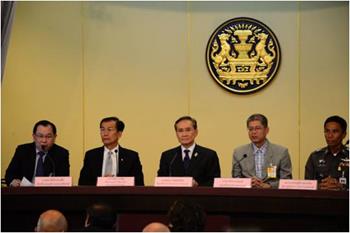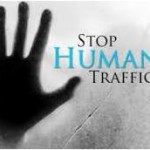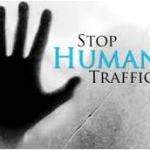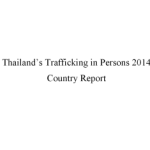
The Thai Government says it is making “significant progress” in combating human trafficking following policy initiatives over the past year.
Deputy Foreign Minister for Foreign Affairs, Don Pramudwinai, said the government has taken steps to address the issues surrounding human trafficking. “We know the current government is sincere about putting an end to human trafficking problems in the country because it has made the problem an urgent issue and … an integral part of its reform agenda,” Don told a press conference on January 30 in Bangkok. He also acknowledged that challenges remain despite the progress made in the past year.
His comments came as Thailand prepared to submit a 154 page annual human trafficking progress report to the U.S. Government for assessment. The Thai Ambassador to the United States Vijavat Isarabhakdi met Kari Johnstone, Acting Director of the State Department’s Office to Monitor and Combat Trafficking in Persons, last week to hand the report, and highlight key progress made by Thai authorities concerned.
In June last year, the United States lowered Thailand’s rating in its Trafficking in Person’s (TIP) report to the lowest ranking Tier 3.
Deputy Foreign Minister Don said Thailand has over the past six months set down tangible results, whether it is amendments to the law and regulations, issues pertaining to the protection of victims, preventive measures or law enforcement. The report divided human trafficking victims in Thailand into covering three areas; prostitution, fisheries, and begging.
The government says key achievements include concrete steps as well as reform within the bureaucracy to coordinate and integrate policies and actions.
Among concrete steps are the registration of some 1.6 million illegal migrant workers, by way of 87 registration centers nationwide, to better protect workers and reduce the risk of them falling victims to labor exploitation and human trafficking. The measure has also helped to raise people’s awareness of labor exploitation and human trafficking, and the penalties attached to it.
Legal proceedings and disciplinary punishment against government officials involved in human trafficking and illegal exploitation, or conspiring to the crime through negligence, have been increased. The government is also strengthening corruption-monitoring mechanisms, so that they can monitor and take disciplinary and criminal actions against corrupt officials without interference.
In 2014, 595 victims of trafficking in persons have been identified; 280 cases were investigated, 115 cases were prosecuted; and 104 defendants were convicted; 5 employment agencies were punished while 134 cases of illegal brokers are being prosecuted. More complex cases are being investigated with cooperation between the government and the civil societies, leading to the rescue of 16 cases involving human trafficking syndicates.
24-hour Hotlines have been made available (‘Dial 1300’) to receive information on all kinds of complaints related to human trafficking, child labor, as well as domestic violence especially those against women and children, with interpreters in 5 languages (Burmese, Chinese, English, Khmer, Vietnamese). These channels, which in 2014 received more than 3,400 complaints, helped law enforcers identify 123 cases related to human trafficking and further investigate and apprehend perpetrators in high-profile cases.
Legal reforms to tackle the issue also include amendments to provide better witness protection programs as well as increasing penalties for trafficking offenders. In addition to that, to prevent exploitation of child labor in the fishing industry, the minimum working age has also been increased to 18 years.
The Thai government’s budget allocation to deal with human trafficking has more than doubled from US$6.56 million to $15.42 million to further strengthen line agencies’ capacity to do their jobs and carry out projects and activities related to prevention, prosecution and protection.
The government is also applying other areas of criminal law, such as anti-money laundering and anti-tax evasion laws, monitoring of suspects and other broader authorities available to Provincial Governors.
During his recent visit to Thailand, U.S. Assistant Secretary of State Daniel Russel, in media comments, said he welcomed the Thai government’s anti-trafficking push.
“We are mindful and appreciative of the commitments and pledges made by the interim government, in respect to trafficking of labor and sexual trafficking of women,” Mr. Russel was reported saying. He added the U.S. was looking for evidence of “real results” to stop trafficking.




